The AWIS-CAC 2024 Membership Survey is live!
Would you like to see more of a specific kind of event or would like more resources included on the website?
Please take a few minutes to fill out the survey: https://forms.gle/x3zRHjY1r75fZkSt7.


The AWIS-CAC 2024 Membership Survey is live!
Would you like to see more of a specific kind of event or would like more resources included on the website?
Please take a few minutes to fill out the survey: https://forms.gle/x3zRHjY1r75fZkSt7.
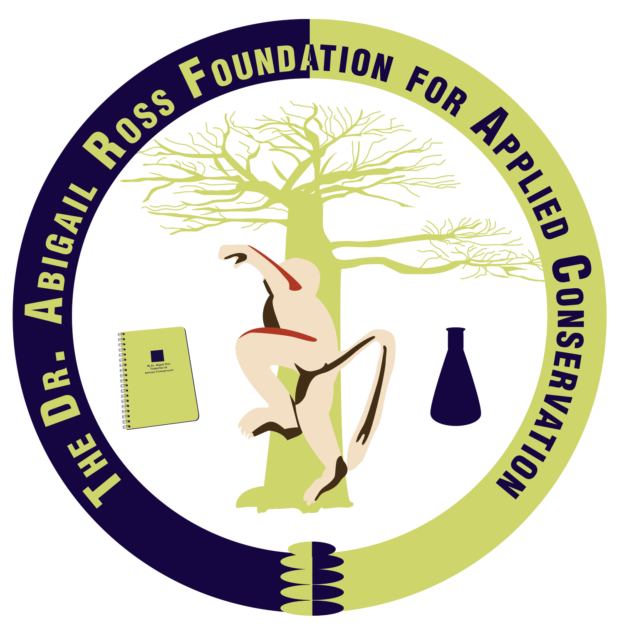
Record-setting grant applications received, more than $55K awarded
Chicago and Rockford, Ill. (May 1, 2024) – The Dr. Abigail Ross Foundation for Applied Conservation (TDARFAC), a leading conservation-focused foundation based in Chicago and Rockford, Ill., has announced the recipients of its 2024 grant and award programs.
Of the 102 applications received from around the world – a record setting amount for the grant program – TDARFAC selected seven recipients and awarded $51,500 in grant funding to those whose conservation research and community-based conservation projects best aligned with the organization’s mission and achieved the following conservation objectives: building capacity, amplifying voices, and partnering with local communities.
TDARFAC’s grant program aims to support individuals, collaborations or partnerships, and non-governmental organizations working on projects based on any non-human primates, their habitats, or any animal or plant species which share and influence the same landscape as non-human primates and directly relate to their conservation.
“We are thrilled at the response to this year’s call for grant submissions and are honored to recognize the exemplary work of these partners and individuals in the field of conservation science,” said Dr. Abigail Ross, founder and executive director of TDARFAC. “We are confident that our Foundation’s grant funding will make a positive difference for these outstanding recipients.”
The grants will fund projects that focus on applied conservation. Following is the full list of the 2024 TDARFAC grant recipients.
The 2024 TDARFAC Grant Funding Recipients
| Recipient Name | Grant Amount (USD) | Project Title |
| Kuenzang Dorji | $15,000 | Revolution in Primate Conservation: A Citizen Science-Based Research and Community-Led Interventions for People and Endangered Gee’s Golden Langur Coexistence in Himalayan Biodiversity Hotspot-Bhutan |
| Katherine Culbertson | $12,000 | Understanding and Overcoming Barriers to Forest Regeneration in Critical Lemur Habitat |
| Dr. Hoby Rabesandratra | $9,000 | Making Lemur Conservation Effective in Madagascar by Proposing an Innovative, Pragmatic and Reflexive Conception of Environmental Education Based on Community and Science |
| Julieanne Montaquila | $8,000 | Exploring the Role of Canopy-Dwelling Parasitic Mistletoes in the Regeneration and Biodiversity of a Malagasy Rainforest |
| Niony Mamy Koloina Rakotoarivelo | $8,000 | Territory Exploitation Strategy of Propithecus diadema Relatively to the Fragmented and Continuous Forest at Tsinjoarivo-Ambalaomby Protected Area |
| Dr. Andrés Link | $5,000 | Reconnecting Isolated Populations of Brown Spider Monkeys (Ateles hybridus): Aligning Primate Conservation, Restoration Ecology with Local Capacity Building in Central Colombia |
| Lucy Millington | $2,500 | Developing New Methods for Monitoring Populations Using Novel Technology |
2024 TDARFAC Award Recipients
In addition to the grant program, the Foundation also developed an annual awards program which honors scientists and activists who make exceptional contributions to the field of conservation and preservation of biodiversity.
This year, TDARFAC recognized the following individuals as the recipients of its inaugural awards program:
Devoted to Discovery: Women Scientist Conservation Award, $2,500
Eliette Noromalala, Ph.D. student at the University of Texas at Austin studying Anthropology
This inclusive award recognizes the extraordinary and cutting-edge scientific work of women in conservation science, particularly focusing on highlighting the work from females from underrepresented communities in higher education.
Noromalala was nominated by noted Malagasy primatologist Dr. Jonah Ratsimbazafy due to her efforts answering key questions regarding infectious diseases in wildlife for the conservation management of endangered lemur species. She is currently a Ph.D. student at the University of Texas at Austin studying Anthropology and is a cofounder of Natior’Ala, a nature conservation association in Madagascar.
Advocates for Change: Future Conservationist & Activist Award, $2,500
Kuenzang Dorji, Director of Khebeythang Nature Center in association with the Ugyen Wangchuck Institute for Conservation and Environment Research in Bhutan
This award honors the achievements of early career conversationists and activists in applied conservation.
Dorji was nominated by Dr. Lori Sheeran, professor of anthropology at Central Washington University, due to his work as a skilled research team leader and his role in primate conservation efforts in Bhutan. He is currently enrolled with the University of Calgary’s Anthropology Ph.D. program and is committed to preserving intact ancient forest in his home country of Bhutan.
Dorji was also awarded a 2024 grant from TDARFAC for his project entitled: Revolution in Primate Conservation: A Citizen Science-Based Research and Community -Led Interventions for People and Endangered Gee’s Golden Langur Coexistence in Himalayan Biodiversity Hotspot-Bhutan.
“With the rapid changes our planet is undergoing, it’s more important than ever to support the next generation of conservation scientists to encourage them to effectively combat the effects of climate change through rewilding,” Dr. Ross said. “Through our awards program, TDARFAC can provide needed funding to up-and-coming conservationists who show enormous promise to help them achieve their career goals while building a more sustainable future.”
To learn more about TDARFAC and its award and grant programs, visit https://www.foundationforappliedconservation.org/grantsandawards.
About the Dr. Abigail Ross Foundation for Applied Conservation
Based in Chicago and Rockford, Ill. with a team operating in the field in Madagascar, The Dr. Abigail Ross Foundation for Applied Conservation aims to bridge the gap between academic breakthroughs in conservation science and applied conservation on the ground by generating actionable conservation interventions. The Foundation supports novel applications of techniques and approaches from the natural and social sciences while leveraging existing knowledge to solve real-world challenges.
A 501(c)(3) Private Foundation that formed in 2023, the Foundation accomplishes its goals by funding direct research and soliciting grant proposals and award nominations annually. Visit https://www.foundationforappliedconservation.org/ to learn more.
This December, we are celebrating this year’s winners of our Annual Innovator & Motivator Awards! In total this year, we honored seven amazing women in STEM, spread over three Innovator Awards, three Motivator Awards, and one Mentoring Program Award.
Event Agenda:
6 – 6:15 PM: Opening cocktails
6:15 – 6:25 PM: Welcome speech
6:30 – 6:45 PM: Presentation of 2023 Innovator and Motivator Awards
6:45 – 7:30 PM: Networking
Alexandra “Sasha” Prokuda, PhD, is the Executive Director of the Chicago Council on Science and Technology (C2ST). During her work with C2ST, Sasha has helped to develop over 200 programs, worked with local, national, and international partners to bring fun and engaging science activities for the public, and prepared and presented reports on science outreach practices at conferences. Before working at C2ST, she was a research and teaching assistant and contributing consultant for the UC Riverside Institute for Development of Education Applications (IDEA Lab). While working on her graduate degree, she volunteered at the Riverside Metropolitan Museum, taught an after-school class at a local elementary school, and founded a scientific meet-up group. Before graduate school, Sasha interpreted science for the public all over the US while working with birds, weasels, deer, bears and Giant Redwoods. Sasha holds a Ph.D. in Evolutionary and Behavioral Biology from the University of California, Riverside and a B.S. in Biology from Pennsylvania State University.
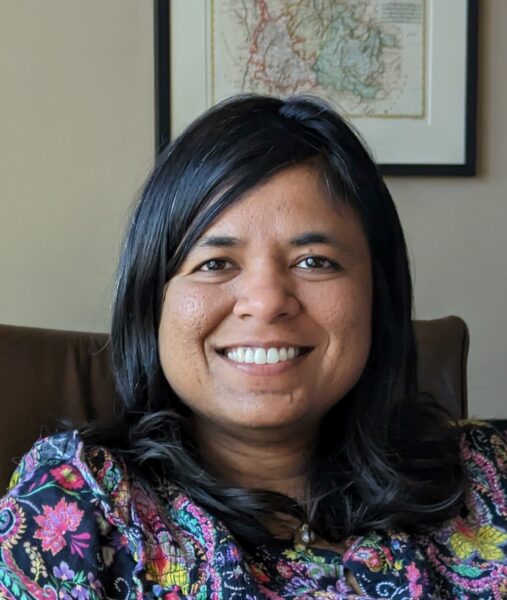
For her research applying synthetic biology to engineer anaerobic acetogen for the production of fuels and chemicals.
Shivani is a Synthetic Biologist working at LanzaTech, a gas fermentation company. She obtained her Ph.D. in Molecule Biology and Biochemistry from Iowa State University, before founding a biotechnology start-up, OmegaChea Biorenewables, focused on harnessing microbial fermentation to convert sugars into lubricants. She continued her training through a postdoc in the Metabolic Engineering Laboratory at Rice University, focused on gas fermentation, before joining LanzaTech in 2018.
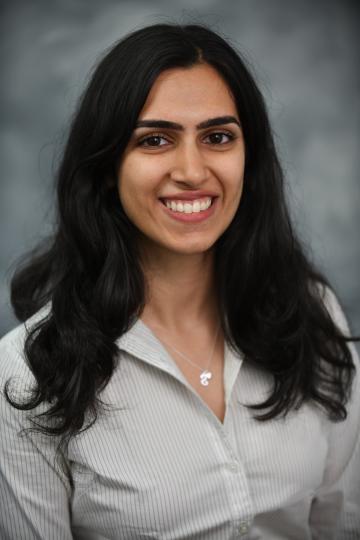
For her research on high-performing biocatalysts using computer-guided methods and applied machine learning techniques to model systems.
Sruti is a scientist on the AI & Computational Biology team at LanzaTech. She holds a Master’s degree in Chemical Engineering with a specialization in Applied Math. In her role at LanzaTech, she actively contributes to the execution of computational experiments, employing machine learning models to enhance biocatalyst design, optimize processes, and predict cellular phenotypes. She specializes in understanding, analyzing, and visualizing complex datasets generated by our interdisciplinary science teams. Beyond that, Sruti stays current with the latest research in the field to keep her work cutting-edge.
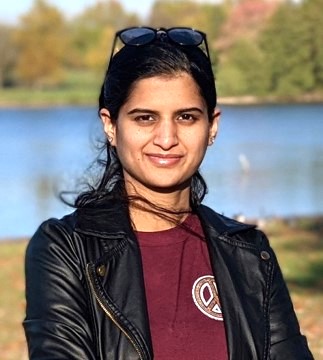
For her research contributions to environmental biotechnology and bioprocess engineering. Specifically, for her research on the biological conversion of methane through the use of methane-eating bacteria to mitigate climate change and utilize waste gases.
Dr. Ashwini Bedekar is a dedicated environmental biotechnologist with a Ph.D. in Biotechnology from India. With over 8 years of experience, she has developed innovative technologies to address environmental challenges, focusing on issues like global warming and water pollution. After relocating to the USA and pursuing a post-doctoral fellowship at the University of Illinois at Urbana-Champaign, Ashwini has become a committed research scientist. Her primary goal is to transform methane gas into valuable chemicals, contributing significantly to environmental sustainability.
For her development of the first-ever mentorship program at LanzaTech, along with her continued dedication to mentoring women in STEM through her participation in AWIS-CAC’s Summer Mentoring Circles, Northwestern University’s scientific internship program, and the iGEM Uganda Team.
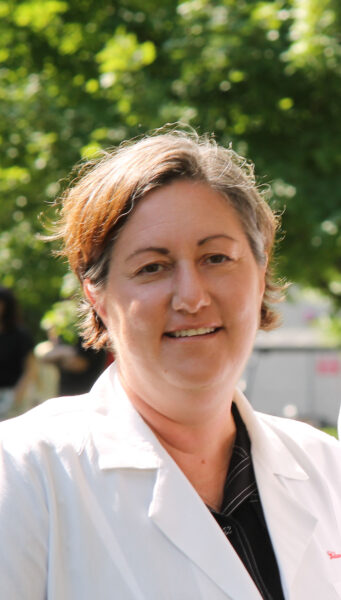
For her demonstration of continued dedication to the support and mentorship of women in STEM disciplines.
Hilary A. Kenny, Ph.D. is a Research Associate Professor in the Gordon Center for Integrative Sciences at the University of Chicago. Dr. Kenny is the co-director of the Ovarian Cancer Research Group and an upper-level cancer biology course, ‘Tumor Microenvironment and Metastasis’ at University of Chicago. Dr. Kenny’s research focuses on the role of the tumor microenvironment during ovarian cancer development and metastasis. Her research has focused on the molecular mechanisms involved in ovarian cancer adhesion, invasion, metabolic activity, and proliferation of multiple microenvironmental factors, including fibronectin, vitronectin, mesothelial cells, fibroblasts, macrophages, adipocytes, NK cells, T cells, and ovarian cancer stem cells. She utilizes different 3D organotypic cultures composed of primary human cells to investigate the different mechanisms of ovarian cancer development, metastasis, resistance to therapy, and confirm these mechanisms in vivo in mouse xenograft models. Dr. Kenny has adapted a 3D organotypic culture to a reliable and robust quantitative high-throughput screen.
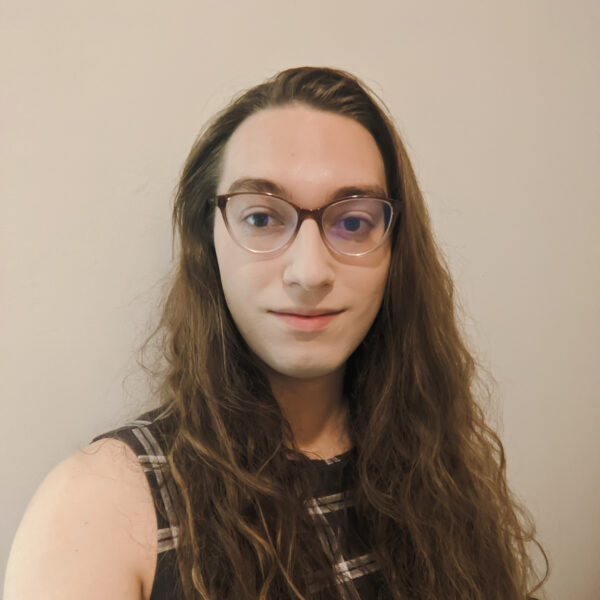
For her dedication to mentorship and education for women and LGBTQIA+ persons in STEM through her participation in ComSciCon 2022’s “Advocating for Science” and IIT’s “Queer in STEM” panels, in addition to her continued support of aspiring research scientists in her positional as a postdoctoral fellow.
Lucille Ray is a postdoctoral fellow at University of Illinois Chicago in the Cancer Health Equity and Career Development T32 program. Her research explores the gut microbiome and its impact on cancer disease states, such as colon cancer and breast cancer, through regulation of hormone circulation in the gut. Her long term goals are to improve health outcomes for marginalized populations through increased research in areas of high health outcome disparity. This includes improved communication and outreach with members of marginalized and underrepresented communities to increase participation in science and bring their voices into the scientific dialogue. Online she can be found on Linkedin and on X (formerly twitter).
For her continued dedication to organizing and running the AWIS-CAC Summer Mentoring Circle Program. Thanks to Laura’s help, our mentoring program has grown immensely over the last year!
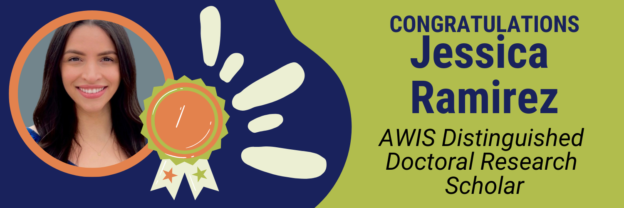
Written by Christina Nowicki, Ph.D.
Jessica Ramirez, M.S., is currently a Ph.D. candidate in Integrative Biomedical Sciences at Rush University in ovarian cancer research. She is a current AWIS-CAC member and a recipient of the 2023 AWIS Distinguished Doctoral Research Scholarship.
Jessica earned her BS in biology from Loyola University Chicago, before working at Rush University Medical Center in the Flow Cytometry, Molecular Oncology, and HLA laboratories as a laboratory technician for five years. During this time, she received her M.S. in molecular medicine from Drexel University while completing her thesis on lung cancer with the Molecular Oncology Laboratory at Rush University. She then began her Ph.D., also at Rush University, in 2020 in Dr. Animesh Barua’s laboratory for translational research in ovarian cancer. Here, her thesis currently focuses on aging and ovarian cancer. The goal of her research is to identify factors or biomarkers that could lead to advancements in early detection methods for ovarian cancer.
Check out our scholarships page for more information about scholarships for women in STEM!
Growing up, my family was always big on science. My dad was a chemical engineer, so he was already in a STEM field. He really pushed us to be the best that we could be in those fields. For me, I just ran with it. In the summertime for fun, we would do math and science books for kids. I know that’s weird, but that’s what I would do. I still had friends I would hang out with! Progressing, going into high school, math and science were always the two subjects I loved most.
When I started college, I took a human genetics class and loved it. The professor was amazing, and she made the information easy for students to understand. For my undergraduate, I did a biology degree and started working at Rush immediately afterward. I started as a lab technician in the flow cytometry department, as well as HLA (human leukocyte antigen) testing, and then moved to molecular oncology. While I was working there, I pushed because I wanted to learn more and didn’t want to get bored doing the same repetitive task. So, they continued to train me, ultimately leading to molecular oncology. That’s what really started my love for research in oncology.
While working there, I knew I wanted to return to school and began a master’s degree in molecular medicine through Drexel University. I loved it because you could do your degree online and I didn’t have to stop working. Since I was already working in molecular oncology, I was able to do my thesis research with the director at the time. I continued to work after that, but knew I still wanted to go further. That led me to the Integrative Biomedical Sciences program at Rush, and it just took off from there. Working at Rush in the oncology field and being connected firsthand to the pathologists and oncologists there made me realize “Cancer research is what I want to do”.
My research focuses on aging and the development of ovarian cancer. Women are typically diagnosed with ovarian cancer in their early to mid-60s. When you age, your cells are exposed to chronic inflammation and oxidative stress. My work aims to find mechanisms or biomarkers that influence chronic inflammation and oxidative stress that can lead to the onset of ovarian cancer. This includes looking at ovaries, fimbria, epigenetic changes, or if there are any mutagenic DNA adducts that form.
Another section of my research also focuses on how we can reverse epigenetic changes. We’re asking, “if we see these epigenetic changes occurring and what mechanisms lead to those changes, how can we reverse them?” That’s where Withaferin A comes into play, which is the active ingredient in ashwagandha. We’re interested in looking at age-associated malignant transformation and how Withaferin A could possibly reverse these changes to prevent or slow the progression of ovarian cancer.
Women who get diagnosed with ovarian cancer often don’t get diagnosed until the late stages because many are asymptomatic, so they believe the symptoms they’re having are part of the normal progression of menopause. Unfortunately, that’s why a lot of doctors also miss the initial symptoms.
There are also invasive procedures required to have ovarian cancer diagnosed. We’re interested in finding an early detection mechanism or creating an early detection product that isn’t as invasive as current methods but is still reliable. The blood/serum marker they currently use to detect ovarian cancer is not reliable. Sometimes, it has lower expression even if you have ovarian cancer or will show increased expression if you instead have an autoimmune disease. The end goal of this research is to identify markers that could lead to the diagnosis of ovarian cancer at earlier stages with less invasive methods.
I would like to go into the industry field, specifically as a medical science liaison. I like that they’re a middleman between a product and physicians. I did KOL (key opinion leader**) engagement when I was doing research and I really enjoyed it. I’m hoping to stay in oncology, not necessarily ovarian cancer, but I would like to stay in the cancer field.
Growing up from elementary all the way to college, I’ve always been one of a handful of women in my courses. For a long time, it seemed so male-dominated that it could be a bit discouraging. Unfortunately, some professors would dismiss you or even talk down to you. On the other hand, you’d have other professors that were all about lifting you up and pushing you to do the best that you could. I don’t want to say it’s been challenging, but it has been an interesting journey.
I do see things slowly changing, though. Like AWIS – it’s amazing to have this community that pushes women to do and be their best. And further, having scholarships to help get them to the next level hugely helps the community. I get a bit emotional talking about it.
I come from a family where in my dad’s generation, the women weren’t allowed to go to school past high school because it was thought they needed to be home taking care of their family. My dad raised three girls and that’s why he pushed us so hard in science. He knew we could advance in STEM and wanted to give us opportunities his sisters never had. It’s great to see AWIS and other organizations also pushing to make a change.
Try to find a person, group, or organization that will give you support within your field. It’s easy to become and feel discouraged when things don’t pan out the way you’ve planned but having that support system can help through the rough times and keep you from giving up. Always remember, there is nothing wrong with standing out and being confident.
**KOL (key opinion leader): A well-known and trusted professional who is an expert in their particular field. For example, a well-respected physician who gets reports on research and helps to decide how to implement that research in a clinical setting.
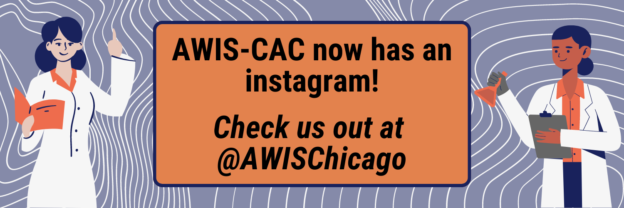
We’re now on Instagram! Give us a follow at @AWISChicago and feel free to reach out to us at awiscommunications@gmail.com if you have any relevant events that you would like advertised to our members!
More details and the application can be found here.
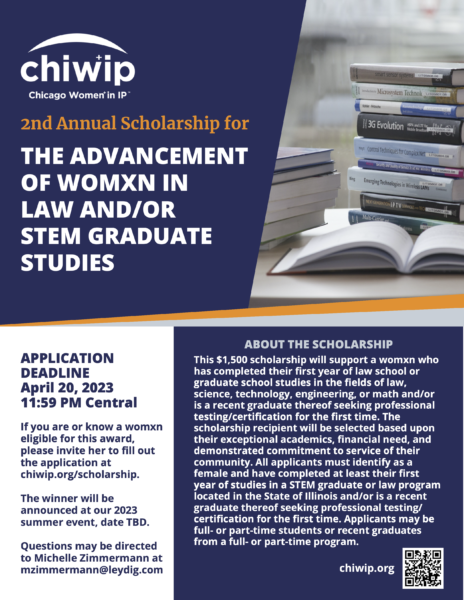
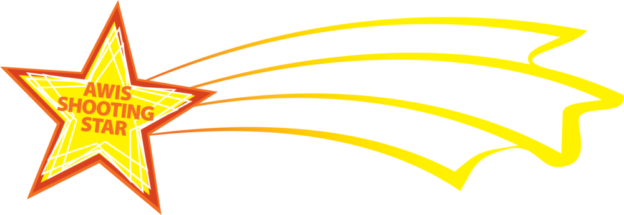
The Association for Women in Science (AWIS) has designated nine ‘Shooting Star’ Chapters in recognition of their initiatives throughout 2022 that supported the AWIS mission of advancing women in science. These chapters include Baltimore, Boston, Chicago, East Bay California, New York Women in Natural Sciences, Notre Dame, Philadelphia, Sacramento Valley, and Seattle.
The winning chapters were determined by AWIS’ Chapter Advisory Committee based on the information submitted in each chapter’s annual report. Each of these chapters will receive a $350 grant for use in chapter activities that impact their community and raise the profile of women in science.
Meredith Gibson, AWIS CEO, stated, “Once again, AWIS members and chapters have showcased their abilities to have a significant impact on their communities, regardless of the chapter size. We are fortunate to have many dedicated members and volunteer leaders working to advance women in science.”
Shooting Star for Mentoring
Click here to read the full article!
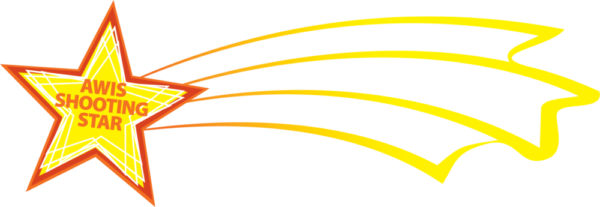
The AWIS Chapter Advisory Committee awarded AWIS Chicago with a Shooting Star for our chapter’s unique initiatives throughout the last year, including our expansive mentoring circles program, successful awards event with expansive award options, and our internship opportunities!
AWIS Chicago is seeking volunteers to support the creation of their Scientist of the Month (SotM) written features and their Innovators & Motivators (I&M) podcasts for 2022. In 2022, there will be quarterly SotM features and I&M podcasts. Volunteers are welcome to support the creation of one or multiple SotMs and/or I&Ms depending on their interests and availability, and there is the option to start volunteering right away and/or later in the year. Descriptions for each opportunity are found below. University students and postdocs are especially encouraged to volunteer to gain valuable scientific communication experience! All duties will be performed virtually. If you are interested in volunteering, please reach out to us at awiscommunications@gmail.com as soon as possible to discuss the opportunities. In your email, please include your past scientific communication experience (this is not a requirement to be a volunteer), if any, and if you are specifically interested in volunteering for the SotM or I&M opportunity (or both).
SotM opportunity:
The SotM series features a person with scientific training who promotes or embodies the advancement of women in the fields of science, technology, or engineering (STEM) from the Chicagoland area. The SotM volunteer will be responsible for interviewing the feature by phone or video chat and then writing a short article (1-1.5 pages in length) that will be published on the AWIS CAC website and social media. Sample questions are provided to prepare the volunteer for the interview. It is anticipated that each feature will require ~5 hrs each to perform the interview and write and edit the feature, and the volunteer will have access to an AWIS CAC mentor throughout the process.
I&M opportunity:
The I&M podcast features a scientist who has demonstrated the ability to innovate and/or motivate in their chosen STEM career trajectory. In the podcast, the scientist is invited into this conversation with their mentee to afford for rich conversations that matter. Typically, each podcast is recorded in about 30-45 minutes, and editing is performed to bring the total podcast to around ~15-20 minutes. The I&M podcast is published on the AWIS CAC website and social media. The I&M volunteer will assist in the podcast production and editing process. It is anticipated that each podcast will require ~5 hrs each for preparation, recording, and editing, and the volunteer will have access to an AWIS CAC mentor throughout the process.
by Marion Thurnauer,
member of AWIS-CAC since its inception and President (1987-88)
During the last year I came across a file containing documents pertaining to AWIS -CAC (Chicago Area Chapter). I have been a member of AWIS-CAC since its inception. However, the extent of my participation with the Chapter has varied over the years. One of the so-called silver linings of our current isolation is that I have been able to re-establish some interactions with Chicago AWIS virtually, as I currently live in Boulder, Colorado.
Here I present a selective ‘history’ of AWIS-CAC from its formation in 1978 until 1988. The ‘history’ is selective because it reflects the material I have saved and my involvement with the Chapter. My goal is to present the activities of the Chapter and hopefully a perspective on why AWIS-CAC has remained relevant for forty-two years.
First, I briefly digress. I received my PhD in Chemistry from the University of Chicago and joined Argonne National Laboratory (ANL) as a Post-Doc in 1974. I was promoted to a Scientific Staff position – Assistant Scientist in 1977. Subsequently, I moved through the ‘ranks’ and currently I am retired with the title Distinguished Fellow Emeritus. During my career (thirty years) at Argonne, I also served eight years as Director of the Chemistry Division. I was president of AWIS-CAC, June, 1987 – December, 1988. Following my term as president, I became involved with establishing and forwarding the Women in Science and Technology (WIST) program at ANL and committed less time to AWIS-CAC.
My first memory of AWIS-CAC is from April, 1978 when I was invited to an informal lunchtime meeting in the cafeteria meeting room. I believe that this was my first experience (in the four years I had been at ANL) seeing so many women scientists in one room – many more than I had imagined as I was alone as a female PhD staff in the Chemistry Division (the different ANL divisions are scattered over a large campus). As I recall the main discussion at the meeting was whether or not to form a Chicago-area chapter of AWIS or form an ANL organization called LINK (I do not remember much about LINK, including the acronym.). It may be that because of the potential for forming a Chicago Area Chapter of AWIS, some attendees came from outside ANL; and this would explain the perception of a relatively large group of women.
It was decided to proceed and establish the Chicago Area Chapter (CAC) of AWIS. (see attached AWIS-CAC Formed 1978.pdf article in Suburban Life Graphic, July 26, 1978).
Apparently, LINK was also formed. I believe that LINK was an activity organized and run by ANL management (perhaps the Affirmative Action Office – an archaic title that one could argue morphed into Diversity and Inclusion offices today.) I do not know how long LINK functioned. I mention this detail to point out an observation; the programs that endure and continue to make an impact are those that are organized and run by the stakeholders.
Once formed, CAC was a very active chapter, holding meetings all over the Greater Chicago area. The number of members and activities varied over the years. For example, during the period I was president, the membership/participation was low. Nevertheless, we (a few women, many from DuPage County) maintained the Chapter, and I am happy to see how well the Chapter is doing today.
I have copies of AWIS-CAC Newsletters from 1987 and 1988 (June/July 1987, Sept/Oct 1987, Nov/Dec 1987, Nov/Dec 1988). They provide more than a glimpse of Chapter activities and interesting reading. I select two newsletters and accompanying material to highlight, as I consider them to be most informative. (note the AWIS-CAC logo)
I attach a copy of the Newsletter.June.July 1987.pdf. This Newsletter provides a detailed ‘flavor’ of AWIS activities, and includes the AWIS-CAC outgoing President’s (Betty Windom) Annual Report for 1986 and the 1986 AWIS-CAC Treasurer’s Report. The chapter was very busy in spite of the declining membership (one can see actual membership numbers – 1983-1986 in the treasurer’s report).
I attachNewsletter Nov.Dec 1988.pdf. In an attempt to increase membership, we mailed this Newsletter to 104 national AWIS members in the greater Chicago-land area who were not AWIS-CAC members. We included an AWIS-CAC information/profile page and a page listing Major AWIS-CAC Activities 1981-1988 Addendum Newsletter 1988.pdf.
In a separate attachment I provide a Long List Past Activities.pdf that includes more activities than the one-page Addendum list.
One can see from the Newsletters that AWIS-CAC continued many activities regardless of the number of members. Most meetings had a speaker on topics of interest, e.g., science, education, outreach related. I recall inviting an early career scientist to speak. She was so appreciative to have the opportunity and experience to speak about her research regardless of the small audience.
The Newsletters show AWIS activities included giving out awards, providing judges for local science fairs, annually presenting plaques and monetary prizes to students at the Chicago Public Schools Science Fair held at the Museum of Science and Industry, and maintaining a Speaker’s Bureau to provide speakers on request to local schools and events.
As I read the lists of past activities, I am struck by how many of the activities are outreach activities, impacting relatively large audiences. I was not present at the “helping her LOOK AHEAD” workshops, but it was common knowledge that they were highly successful. When we organized the first “Science Careers in Search of Women” workshop, for college women, at Argonne in 1987 (third item on short list), the “helping her LOOK AHEAD” workshops provided a template. The “Science Careers in Search of Women Conference” is still held annually for high school students. Last year it was a virtual conference.
The museum exhibit “MY DAUGHTER, THE SCIENTIST” had a relatively long run at the Museum of Science and Industry and also became a traveling exhibit. In the September/October 1987 Newsletter, I wrote “.. we recently received a letter from a teacher in Massachusetts who learned about AWIS-CAC via advance publicity from the Museum of Science, Boston, which will be showing the exhibit MY DAUGHTER, THE SCIENTIST.” She was requesting a copy of the “Bibliography of Career Pamphlets” [see below] which also originated from AWIS-CAC.
AWIS-CAC received a request from National AWIS to coordinate activities and plan symposia for the AAAS meeting held in Chicago in February, 1987. This activity is described in Betty Windham’s summary (Newsletter June.July 1987.pdf).
AWIS-CAC published a 37 page Bibliography of Career Pamphlets and other useful material (1984) updated 1988 (see attached Front Page Bibliography.pdf ). This document was very popular and available from National AWIS and AWIS CAC. (This was the time before widespread availability of the internet and Google.)
The 1988 Annual Report.pdf of my tenure as President June 1987 – December 1988 is attached. One activity summarized in my annual report, is Testimony to the Congressionally-Mandated Task Force on Women, Minorities, and the Handicapped in Science and Technology. I also attach a copy of my Testimony MCT.pdf. Information about the Task Force can be found in the attached Interim Report.pdf from the AWIS National Newsletter.
I was encouraged that the Task Force was mandated and held hearings in seven US cities in 1987 and 1988. The attached Interim Report.pdf states “The role of minorities, women, and people with disabilities in science and engineering is widely seen only as an equity issue, not as the key to future national strength in science and technology.” I recall articles and discussions during the time of the hearings, that posed the question “Who will do science in the year 2020?” At the time students choosing science and engineering were predominantly white males. Demographic projections showed that by 2000, white males would make-up only 25% of the US work force.
I do not know what if any specific actions were taken in response to the Task Force Report. However, unforeseen events, such as the breakup of the Soviet Union, in the late 1980’s and early 1990’s to some extent ameliorated the demographic issues. Students and scientists from Eastern Europe, Russia, and Asia joined the US scientific workforce. However, in 2021 the goals and recommendations outlined in the Interim Report have not changed.
As I was considering how to present this AWIS-CAC history, I received the following in my Email Inbox on 1/5/2021:
“The Journal of Chemical Education announces a call for papers for an upcoming special issue on diversity, equity, inclusion, and respect in chemistry education research and practice. Nationally, students exit chemistry and other science, technology, engineering, and mathematics (STEM) disciplines at rates that threaten the stability of the STEM workforce. The departure of women and ethnic and racial minorities from many STEM disciplines can be twice as high than other student groups. This departure is preventing the nation from realizing an inclusive and resilient economy.” (entire announcement attached: Call for Papers JChemEd)
After receiving this email, I thought, “In some ways, the AWIS-CAC Testimony MCT could be recycled today.” Note: Words from the Testimony: ‘Our purpose is to tell you about programs we have organized which have been designed specifically to: 1) provide career counseling to young women; 2) encourage young women to stay in science; and 3) educate the general community …’
All of this is a long way of saying: In my opinion, AWIS and AWIS-CAC has endured and remained relevant because the organizations have not strayed from their original goals and values. (for goals and values see: Addendum Newsletter 1988). The AWIS-CAC activities described above are as relevant today (perhaps with some updating) as they were thirty years ago. Many members have dedicated volunteer time to outreach activities that at the time had significant impact on a number of young women and teachers. At the same time, AWIS served (serves) to provide networking and visibility for its members.
The last year, 2020, brought incredible unexpected events. We certainly did not predict all that happened during the last year from the pandemic, the Black Lives Matter protests, the election and attack on the Capitol building. I agree with those who say we are at a pivotal point, poised to see societal change. We cannot predict how these changes will play out, but we are witnessing much that is positive relevant to AWIS, women in STEM. For example, women have gained visibility: several articles have been written about the women who have made major contributions to COVID vaccine discovery and development. See this article published in Bloomberg, for example.
Many women scientists are called upon to comment publicly on COVID-19 issues and questions. I read that because of the pandemic, there is a surge in students applying to medical schools. I am hopeful that we will see a similar surge in students interested in STEM fields as they are now witnessing science in real time.
On the other hand, the pandemic has resulted in unpredicted setbacks for women. Many are being challenged to find new ways to manage childcare and facilitate online learning. Some are dropping out of the workforce.
Again, as I was writing this, my weekly issue of the American Chemical Society’s ‘Chemical and Engineering News’, Jan 18/25, 2021 arrived in my Inbox. The attached C&ENews.pdf and the link below of the same article from this issue: ‘How COVID 19 Has Changed the Culture of Science’ (the Good and the Bad and the Unknown) expresses the issues I mention above and more. I recommend reading the article.
At the same time, we are experiencing an incredible (to me) and hopefully authentic focus on equity, inclusion, and diversity triggered by the events that led to the Black Lives Matter protests and the realization that people of color are disproportionately affected by the pandemic. I am encouraged to read the important issue of unconscious bias was discussed in David Brooks, NYTimes Opinion Piece, January 1, 2021. Although he was mainly referring to racial bias his comments are relevant to the gender bias, we have recognized and studied for at least twenty plus years.
Of course, I must add – 100 years after women gained the right to vote—we have elected a woman Vice President; and importantly, the news media continue to point out that Kamala Harris’s election is historic.
Bottom line: I am cautiously optimistic that the new emphasis on diversity and equity across many fields, e.g., music, entertainment, science, etc., is authentic. I hope this snapshot (1978-1988) of AWIS-CAC illustrates that organizations such as AWIS have laid the groundwork and continue to develop the tools to be proactive in addressing both the positive and negative issues that will be the outcome of these challenging times.